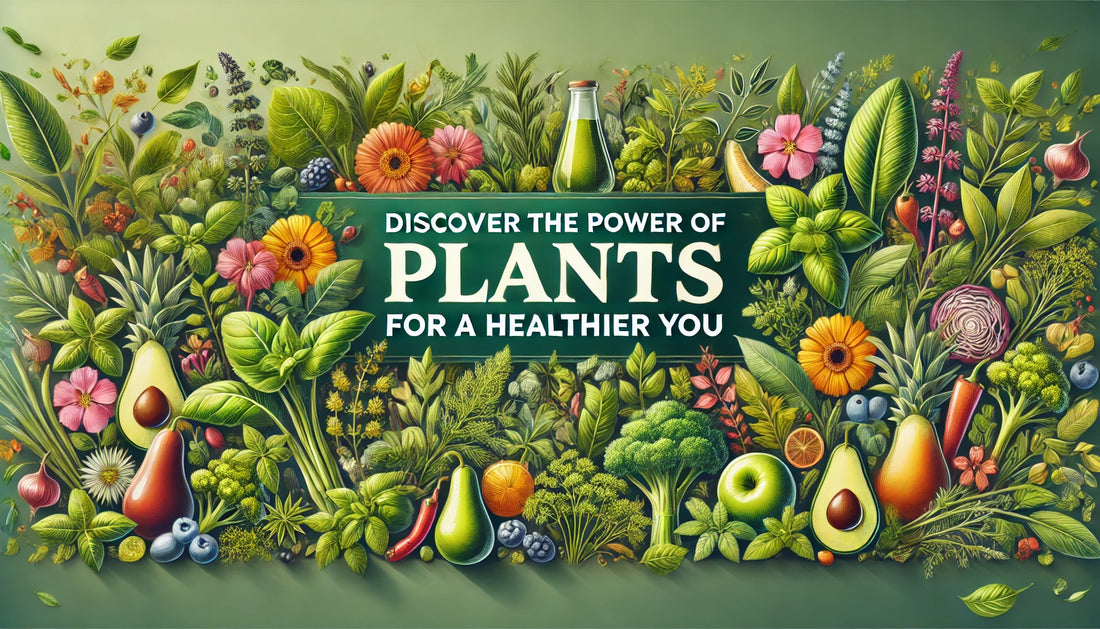
Exploring the Benefits of Plant-Based Diets
Share
Discover the Power of Plants for a Healthier You
Introduction

Have you noticed the buzz around plant-based diets? If you're wondering why so many people are making the switch, you're in the right place. This blog post dives into the undeniable benefits of plant-based diets, tailored specifically for those looking to enhance their health and well-being. By the end of this read, you'll have a clear understanding of how plant-based eating can positively impact various aspects of your life, along with practical tips to get started on your plant-powered journey.
Health Benefits of Plant-Based Diets

Improved Heart Health
Heart disease remains a leading cause of death worldwide. Research shows that plant-based diets can significantly improve heart health. Consuming a variety of fruits, vegetables, whole grains, and legumes helps lower blood pressure, reduce cholesterol levels, and decrease the risk of heart disease.
Weight Management
Struggling with weight management? Plant-based diets might be the answer. These diets are typically lower in calories and higher in fiber, promoting satiety and reducing overall calorie intake. Many people find it easier to manage their weight and even lose excess pounds when they switch to a plant-based diet.
Enhanced Digestive Health
Fiber plays a crucial role in digestive health, and plant-based diets are packed with it. Increased fiber intake helps regulate bowel movements, prevent constipation, and reduce the risk of digestive disorders such as irritable bowel syndrome (IBS). A healthy gut also supports nutrient absorption and overall well-being.
Reduced Risk of Chronic Diseases
Plant-based diets have been linked to a lower risk of chronic diseases such as type 2 diabetes, certain cancers, and hypertension. The abundance of antioxidants and anti-inflammatory compounds in plant foods helps protect against cell damage and reduce inflammation, promoting long-term health.
Boosted Immunity
A diet rich in fruits, vegetables, nuts, and seeds provides essential nutrients that support a strong immune system. Vitamins A, C, and E, along with zinc and selenium, enhance immune function, helping your body fend off illnesses more effectively.
Practical Tips for Transitioning to a Plant-Based Diet

Start Slow
Transitioning to a plant-based diet doesn't have to happen overnight. Begin by incorporating more plant-based meals into your weekly routine. Experiment with new recipes, and gradually replace animal products with plant alternatives.
Explore Plant Proteins
Protein is a vital nutrient, and plant-based diets offer plenty of protein-rich options. Incorporate beans, lentils, tofu, tempeh, quinoa, and nuts into your meals. These foods provide all the essential amino acids your body needs.
Plan Balanced Meals
Ensuring adequate nutrition is key to a successful plant-based diet. Aim for balanced meals that include a variety of food groups. Combine different vegetables, grains, legumes, and healthy fats to meet your nutritional requirements.
Learn to Read Labels
When shopping for plant-based products, read labels carefully. Look for whole food ingredients and avoid heavily processed items with added sugars, unhealthy fats, and artificial additives. Opt for organic and non-GMO options when possible.
Find Plant-Based Alternatives
Craving your favorite non-plant-based dish? There are plant-based alternatives for almost everything, from dairy-free cheeses to plant-based burgers. These alternatives can help make your transition smoother without sacrificing taste.
Common Myths About Plant-Based Diets

Myth 1: Lack of Protein
One of the most common misconceptions about plant-based diets is that they lack sufficient protein. In reality, plant-based foods can provide all the protein you need. Combining various protein sources throughout the day ensures you get a complete amino acid profile.
Myth 2: Limited Food Choices
Some people believe that plant-based diets are restrictive and lack variety. On the contrary, plant-based eating opens up a world of culinary possibilities. From international cuisines to creative twists on classic dishes, there's no shortage of delicious options.
Myth 3: Too Expensive
Another myth is that plant-based diets are expensive. While specialty products can sometimes be pricey, whole plant foods like beans, grains, and seasonal vegetables are budget-friendly. Planning and buying in bulk can also help reduce costs.
Joining the Plant-Based Community

Engage with Others
Connecting with like-minded individuals can make your plant-based journey more enjoyable. Join online communities, attend local plant-based events, or follow social media influencers who share recipes and tips.
Educate Yourself
Stay informed about the benefits and best practices of plant-based eating. Read books, watch documentaries, and follow reputable sources of information. Continuous learning will empower you to make informed choices.
Involve Your Family
If you're transitioning to a plant-based diet, involve your family in the process. Share the benefits with them, cook together, and introduce them to new foods. Creating a supportive environment can make the transition smoother for everyone.
Making a Positive Impact

Healthier You
By adopting a plant-based diet, you're making a positive impact on your health. Enjoy improved energy levels, better digestion, and a reduced risk of chronic diseases. Feel confident in your choice to prioritize well-being.
Supporting Sustainability
Your dietary choices also contribute to a healthier planet. By reducing your consumption of animal products, you're helping conserve resources and reduce environmental pollution. Every plant-based meal is a step toward sustainability.
Inspiring Others
Your plant-based journey can inspire others to explore this lifestyle. Share your experiences, recipes, and successes with friends and family. You might encourage someone else to make positive changes in their life too.
Conclusion

Incorporating more plant-based foods into your diet offers a plethora of benefits, from enhanced health and well-being to a positive impact on the environment. Whether you're looking to fully transition or simply add more plant-based meals to your routine, the steps outlined in this blog can help you get started.
Ready to take the next step? Explore more resources, try new recipes, and join a community that shares your passion for plant-based living. Your journey towards a healthier, happier you begins today.
